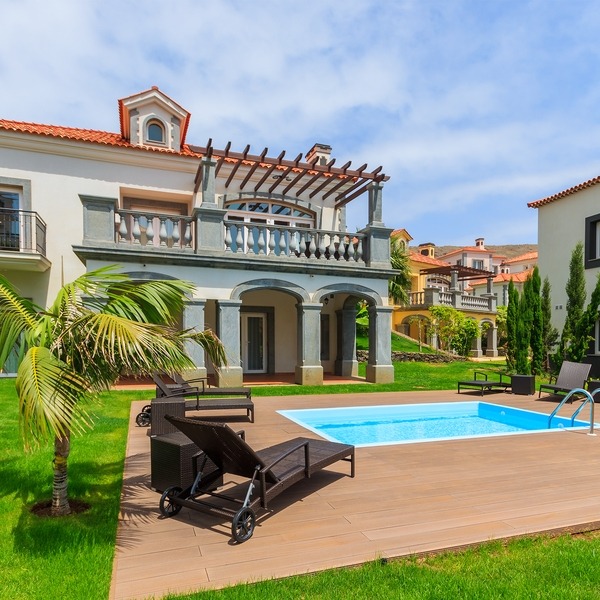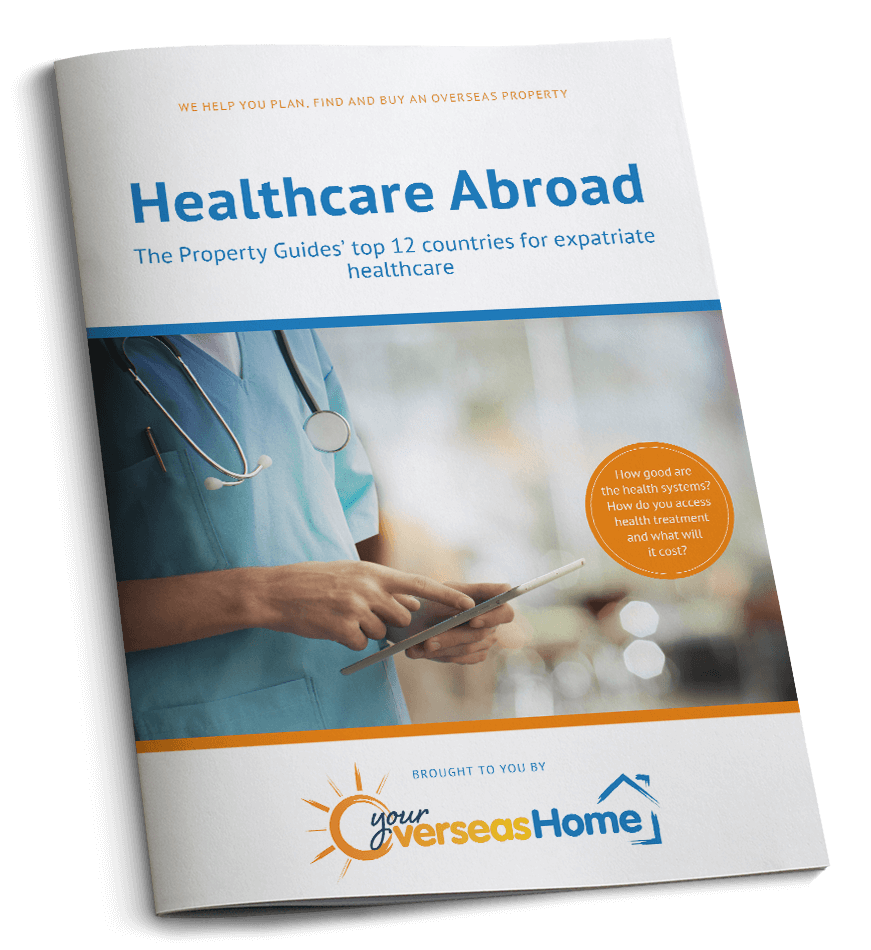Making the decision to buy property and move to Portugal is exciting, whether you plan to live there permanently or visit often for long holidays. There is also a lot to consider when living in another country. Luckily, we can help you every step of the way, so you can settle in properly and make the most of living in Portugal.
Through our team of experts and expats, we have been able to pull together all the practical information to help you make the most of your new home, including:
- Settling into life in Portugal
- Cost of living in Portugal
- Healthcare in Portugal
- Learning to speak Portuguese
- Getting connected
- Legal matters when living in Portugal
- Travel and transport in Portugal
- Working in Portugal
- Schools in Portugal
- Renovating your home
- Getting your pets to Portugal
- Portuguese culture and customs
- Sports in Portugal
- Shopping in Portugal
Settling into life in Portugal
Before you move to Portugal, the chances are you’ll already feel familiar with the country as a regular holiday destination. However, the reality of living in a country, rather than holidaying there, is often quite different.

Feeling a sense of homesickness when you move is perfectly natural as an expat. However, it does calm down once you are settled in properly and start to regard Portugal as your home. If you prepare in advance and do your research, you will find settling in Portugal considerably easier. And if you do feel any homesickness, there are a few ways you can help combat those sentiments and settle into your new life.
Allow enough time to get used to it all
When you make your final move to your new home, make sure you allow some time just to relax and get to grips with the new surroundings. Take a break and enjoy the place, just as you normally would on a holiday. Allow time to take everything in and absorb the changes. This will help give you the energy to face any practical challenges that lie ahead.
Try to learn the language
Don’t underestimate how useful it is to learn some Portuguese before you live in the country. It makes settling in Portugal feel far more natural.
Try to ramp up your efforts to learn the language in the early days. After all, you now have access to neighbours, local shopkeepers, restaurateurs, and bar owners who you can practice with! It’s perfectly normal to feel nervous about speaking a new language with native speakers. However, you will find that the Portuguese always appreciate any efforts to speak the language and will usually be patient with you while you try. If you are trying out your Portuguese in a local bar, a little “Dutch courage” may be helpful!
Be prepared for bureaucracy
Legal and official matters do not work in the same way or at the same pace in Portugal as they do in the UK or USA. It’s important to accept this from the outset. You’ll need to get used to the fact that these processes can prove slow and, at times, painful. Thankfully, all of the benefits of life in Portugal make this bureaucracy seem worthwhile.
Get connected
One of the first things you need to do is to get a mobile phone and some internet connectivity. Do some research online before you go, so you know what deals are on offer. Getting a 3G or 4G hotspot set up when you first get to Portugal can be incredibly helpful. Feeling connected (and able to look things up) will stop you from feeling adrift in those critical early days.
Take the time to research the different mobile phone packages available. That way you can make sure you get a good deal on international calls, so you can easily and regularly speak to loved ones in other countries. They tend to cost approximately €50 per month, but this isn’t really that much when you consider how it keeps you connected.
Facebook, Twitter, and other social networks are a great way to stay in touch with friends and family you have left behind. They make it easy to keep up to date with all the latest news and goings-on. Social media has its downsides. However, in some ways, people feel much closer these days thanks to the wonders of the internet. Social media is a particular lifeline when you’re overseas.
Read our top tips on settling in and socialising in Portugal
Get to know the Portuguese shops — and do some shopping!
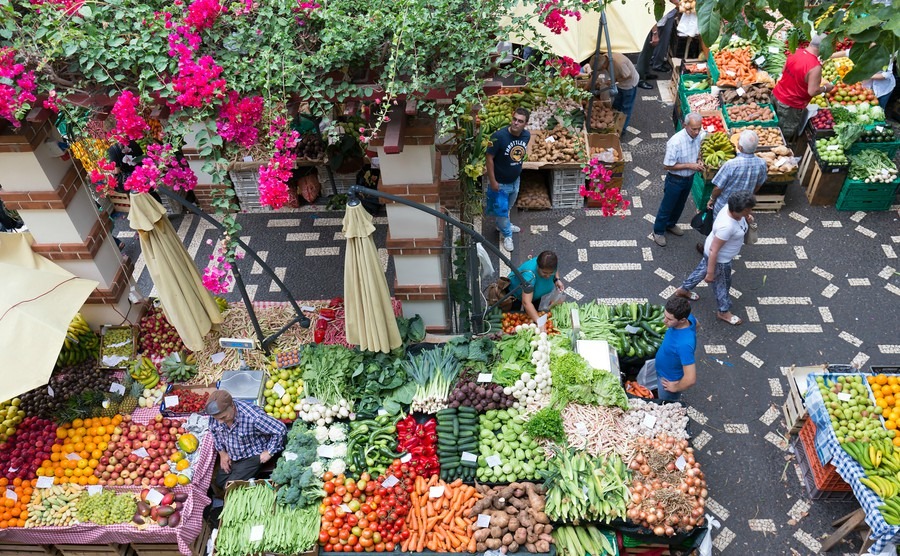
In the time you have to acclimatize, wander at a relaxed pace around your local shops and markets. This is a great opportunity to get to know the locals and try out your Portuguese language skills. You can also take the opportunity to learn which shops sell some of those essential foods and comforts from back home.
Meet the expats
You may prefer to surround yourself with local people, rather than spending all your time with other expats. However, expats already living in Portugal can provide a valuable support network. They will prove an invaluable source of useful information on the local area and will be able to fill you in on what it’s really like to live there as a non-Portuguese national.
By taking advantage of the many local activities and meetings on offer in Portugal, you should soon find some like-minded people. You can find expats in local bars, at the supermarket or market, and even online before you go. Places to look include Facebook, Twitter, and expat web forums. There’s also an expats society, AFPOP, which you may wish to check out.
Plan your paperwork carefully
After some time to get to grips with your new home and local area, you need to get down to business. You will have practical matters to attend to, such as registering at a local medical centre, organising residency status, or perhaps buying a car.
Draw up a list of all the important matters that you need to address, in order of priority, then start working your way through it systematically. These things almost always take longer than you expect. Just keep going and don’t give up hope, however long your ‘to-do’ list may be!
Find a good takeaway
One of the many reasons people buy a home in Portugal is to enjoy the local food and drink. However, if you’ve been busy setting up your utilities, or queuing at a government office to submit forms, the prospect of venturing out or cooking a meal may lose its appeal.
Thankfully you’ll find plenty of takeaway (pronto a comer) establishments in Portugal. These range from the typical British favourites of Chinese, Indian, or pizza, to Portuguese takeaways selling things like duck rice and piri piri chicken. Unless you’re in a large town or city, you are unlikely to find a delivery service, so you will at least need to take yourself around the corner! Still, this is another opportunity to practice your Portuguese.
Make sure everything is organised ‘back home’ while settling in Portugal
You will also need a list of all the practical tasks you need to complete back home. These include things like setting up a postal redirection service and cancelling any non-Portuguese mobile phone contracts.
It’s also important that all your online accounts are in order. Make sure correct address and contact details are in place to reflect your new home. Most importantly, ensure that you have notified the tax authorities in your home country, as your move abroad is likely to significantly impact your tax situation.
Keep track of your budget
Don’t get carried away as soon as you get to Portugal and treat the move like a holiday. Many people move to Portugal for the quality of life and look forward to enjoying its cost-effective reputation. However, you should still keep a firm hold on your budget as you start settling in Portugal, and work out what is realistic now that you are living in a new country. Our guide to buying property in Portugal will help you plan for your finances after you move.
Travel back to your old home — or get friends and family to visit regularly
It’s a good idea to plan regular trips to see family and friends in your old home or elsewhere. You can, of course, also invite them to come out and experience the joys of living in Portugal for themselves! The sense of occasion and anticipation of meeting up with loved ones often compensates for the pangs of homesickness you may feel at other times. Focus on the positives, and really enjoy your time in and out of the country.
Accept that you will feel homesick at times
It doesn’t matter how long you have lived in another country. You will still get the occasional wave of homesickness. These can often be triggered by the strangest or slightest things. It gets less and less troubling as time goes on, so the best approach is to accept that, at times, you will feel a longing for your old home. That way you can look ahead to all you have to look forward to in your new life in Portugal.
Cost of living in Portugal
The lower cost of living is, for many of us, one of the main reasons to move to Portugal. Towards the end of every year, we conduct the Cost-of-Living Index across 8 countries. It compares the prices of a basic supermarket shop and other everyday living costs, especially geared to expatriates. So how does the Portuguese cost of living compare to the UK?

You will need to spend some time working out what exactly you will need to pay and what for to make your dreams come true.
The living costs in Portugal often seem notably low, and it’s clear that many everyday food items remain much cheaper than they are in the UK. Overall, our “shopping basket” was 20% cheaper in Portugal than in the UK, but with careful shopping, life in Portugal can be even less expensive.
Prices really do vary from place to place. You can find vast differences in price from supermarket to supermarket, and from market stall to market stall. The differences are most stark when you compare businesses aimed at tourists with those for locals. It’s quite possible to find yourself spending between 80 cents and €3.50 for the same bottle of beer, depending on whether you are ordering it at a small locals’ snack bar or glitzy beachfront restaurant.
As is the case in many small countries, many products are imported, which results in some interesting price disparities. Cosmetics, for example, are often more expensive than they are in Spain, because they’re imported from there. In addition, anyone who insists on having lots of UK products on hand will pay a heavy price, as these imported goods don’t come cheap. Many people actually use shipping services to bring these items over in bulk from UK supermarkets.
It really does pay dividends to get to know local shop and stall owners. You won’t just enjoy better prices, you’ll enjoy the best of the produce too, so get out there and put your Portuguese language skills to the test.
To accurately budget for your move abroad, read The Smart Currency Guide to Emigration, free to download.
In the supermarket
Firstly, we wouldn’t necessarily recommend buying fresh produce and seasonal fruit and vegetables at a supermarket. Many local markets are both cheaper and offer better quality. But for the sake of comparison we have stuck with supermarkets (just like the UK, this is a hardworking culture where we don’t always have the time to look around markets!)
Above all, the one thing certain to increase the cost of living in Portugal is a refusal to adapt to local products. Imported British brands are easy to find, especially in Lisbon and the Algarve. However, you will pay a substantial premium for insisting on Heinz, Kingsmill, and cheddar! There are fantastic local equivalents, and it just takes a little experimentation to find them. For example, Ilha cheese from the Azores is a perfect substitute for cheddar. For fish, we chose the local salt cod, bacalhau, which is very popular in Portugal.
Travel
Moving from food to motoring, you will notice that Portugal is one of those rare places where fuel is actually more expensive than it is in the UK. In fact, Portuguese residents close to the border often drive to Spain to fill up, which saves some money.
Driving in general is an expensive business in Portugal. The cost of vehicles themselves is often a big shock to new arrivals. Cars hold their value, and the Portuguese climate cuts right down on damaging rust. It’s far from unusual to see cars on sale with several hundred thousand kilometres on the clock — and that’s simply because they last.
In the home
When you come to decorate your home, you may find yourself joining the Portuguese people in being very critical of local paint. For deliveries, although Amazon don’t deliver to Portugal, you can buy an Alexa from Spain and use it for all the other tasks it helps with, such as the weather. “Alexa, will it be sunny again today?” “Yes of course it will Ben, we’re in the Algarve.”
There are several IKEA in Portugal, including in the Algarve.
Leisure
One of the best things about life in Portugal is the comparatively low cost of every day ‘luxuries’. A life built around bottles of good wine, excellent coffee in friendly cafés, and affordable set lunch menus is still possible on a real budget — and the sunny weather is always free!
Healthcare in Portugal
If you have an existing GHIC, it will cover your basic and emergency healthcare, even after Brexit. While these cards do not cover your dental care, if you are paying into the tax system you should get your initial examination free. Hence, we have said it is free. However, like in the UK, any extra treatment will need to be paid for.

If you’re living in Portugal permanently, we advise registering with the Portuguese healthcare system, and taking out private health insurance if you wish. You can find out how to do this in our moving to Portugal guide.
Children
If you’ll be living in Portugal with children, there are a few other living expenses you’ll need to factor into your budget. While the essentials are slightly more expensive in Portugal, leisure activities are generally cheaper. Other
Many non-essential costs are also cheaper in Portugal compared to the UK. You can get things like clothing, a hotel, and your regular haircut for a little less money than back home.
Learning to speak Portuguese

The easiest way to learn is to engage with locals
It is unlikely to surprise you that learning Portuguese is the key to a successful integration in Portugal, and even just a few words can help to make your new life here so much more enriching.
Learning a language can be hard, and Portuguese is not an easy one to master! In fact for a European language, Portuguese is considered particularly difficult — which makes it easy for Brits (who quite often can find someone to converse with in English) to be put off learning it.
On first encountering it, Portuguese looks and sounds like a hard language to learn thanks to some unusual pronunciations. Words often sound nothing like they look like they should on paper, which adds an extra level of complexity beyond merely picking up the vocabulary.
However, making an effort to learn the language is hugely worthwhile if you plan to spend extended periods in the country. While it’s possible to get by speaking English in tourist areas and major cities, if you’re planning to integrate and truly understand the country, every extra word you learn of the language will make it easier. Move out to the countryside and if you can’t speak the local language you’ll have to make do with sign language!
Whether you need repairs, help at the local grocery store, need to consult a local builder, or want to programme your phone answering service, understanding and speaking the basics will reduce your stress level — and that of those around you! Communication is such an important part of everyday life — not just for official business, or knowing what you are buying, but also for making friends and being part of the community!
Here are some tips to help you on the way…
Do as much work as you can before arrival
A vast number of expats say they wish they’d put more work into learning the language before moving abroad. So don’t fall into the “I’ll pick it up when I get there” trap. Unless you’re younger than ten years old, it just doesn’t work like that.
It’s easy to start learning before you leave: use Post-It notes to remember the words for household objects by sticking them around your home, replace your music CDs with language CDs, and begin to look at Portuguese websites with a little help from Google Translate (beware — take some of the more literal translations with a heavy helping of salt!). It all adds up in acclimatising yourself to the new language.
Some of the simplest expressions are those that you end up using every day and can prove very useful. For example “posso?” (pronounced poss-oo) simply means “may I?” and can apply to taking a chair from a neighbouring table or helping yourself to a drink.
Another good one is “já pedi” (pronounced ja-pudee) which this means “I’ve already been asked”, and is handy for those moments in shops, bars and restaurants when someone tries to help you and you’re already being served.
From these small shoots your grasp of the Portuguese language will grow, as your confidence improves and your understanding of the replies you receive develops.
Choose your tuition wisely
When you arrive in Portugal, you’ll find plenty of options for learning the language. Many councils run public courses, for example. These tend to teach ‘school style’ Portuguese which, while useful, doesn’t necessarily teach you the most practical day-to-day things first.
Other classroom sessions or one-to-one options are generally available too. If you’re paying for tuition, be sure to choose learning that focuses on the areas of the language you think will be of most use to you.
Ensure you listen to pronunciations
Portuguese is not a language to simply learn from a book: several words look similar to Spanish, but the pronunciation is completely different. You really need to learn the words as they are spoken to have a chance of being understood yourself.
Learn the correct Portuguese!
There are two distinct versions of the Portuguese language: Brazilian Portuguese and European Portuguese. Many people liken the difference between these to UK English and American English.
Although they are similar, the accent is different, as are several words, so make sure you learn European Portuguese if you’re moving to Portugal. It’s worth noting that the popular Rosetta Stone language courses teach Brazilian Portuguese, so you’re best choosing another resource.
Beware of local dialects
Just as Londoners tend to sound rather different to individuals from Newcastle, accents vary significantly across Portugal!
This is particularly noticeable in the Algarve, where there is a tendency to clip words, sometimes at the beginning and end! If you’ve been learning from a language course, you may well find you can understand people from Lisbon but struggle to comprehend ‘Algarvian’ Portuguese. It’s also worth accepting that if you live and learn in the Algarve, this is the dialect you will end up speaking yourself!
Try speaking Portuguese first
Sometimes it can be hard to actually get anyone to speak Portuguese to you in Portugal, as many of the locals have an excellent grasp of English. Especially if you’re in the Algarve and they know where you’re from, as there’s a common assumption that you won’t be willing to attempt to speak the language.
The best way round this is to always speak Portuguese first. It won’t always mean the person you’re talking to will reply in Portuguese, but if you act like a tourist, you’ll continue to be treated like one.
This won’t be a big problem in less touristy areas in the north of the country, where less people speak English. In fact, you’ll need to make sure your Portuguese is up to scratch in some rural areas, otherwise you’ll have trouble communicating.
Don’t be afraid
The only way to develop your Portuguese is to constantly work on it. It can prove daunting, but sometimes you’ve just got to strike up a conversation and give it a go. Even if you get it horribly wrong, people will have more affection and respect for you than if you didn’t try at all.
Practice at the town hall
Portugal is something of a bureaucratic country. However maddening this can be at times, you can turn it around. For example, should you have to go to the town hall (câmara) to find out anything about your property, your land, or simply to register for any course or local festivity, use the time you are there to practise your Portuguese. Listen to the way they explain things and the expressions they use.
Encourage friends to correct you
When you make your first Portuguese friends, ask them if you can practice your Portuguese with them and continue to do so regularly. If you have good Portuguese friends, it’s worth actively encouraging them not to be tactful when you speak Portuguese and to correct you on your mistakes. They will also be able to teach you new words and colloquialisms.
This is a really quick way of learning that tends to stick — so long as you don’t take the feedback too personally. This can be much more useful than learning ‘proper’ Portuguese using a language tape or course, as you’ll learn slang and understand different accents.
Persist in using the language you’ve learned
As so many people speak English in Portugal, it’s often the case that the person you’re speaking to will speak English better than you speak Portuguese. This often leads to the temptation to switch the conversation to English to make life easier for everyone. To avoid missing out on learning opportunities, try to persist in speaking Portuguese, and explain you’re trying to learn. Invariably your efforts will be appreciated!
Getting connected
An important element of settling into your home in Portugal is getting connected to essential services to stay in touch with friends, family, news, and the rest of the world.
Portugal is very well connected and the communications infrastructure is ahead of the curve. It even had 4G before the UK. You need to consider how you will get yourself set up with each of the following services in your new home in Portugal:
Television
You are probably going to want to watch some TV when buying a place in Portugal, whether you plan to move there permanently or enjoy long holidays. There are four terrestrial TV channels in Portugal, although you’re still likely to need a digibox or digital TV to be able to receive even these basic channels. Although these are free to view, a nominal television licence fee will be added to your electricity bill. You will find that most of these channels show only Portuguese programmes, but the majority of the films shown are in English, with Portuguese subtitles. Watching films like this is a great way to brush up on your Portuguese language skills.
Satellite, TV, and Internet packages
If you want more choice of TV channels, you can get set up with a satellite provider. The most popular satellite TV providers in Portugal are Meo, from Portugal Telecom, and Zon, which provide a lot of programmes in English and the usual mix of lifestyle, sport, and news content. These providers offer packages much like you may be used to in the UK, for example, combined television, phone, and internet, like Sky or Virgin offers in the UK. An all-in-one satellite TV, internet, and phone package will cost around €40–70 a month, depending on the package you have selected and the speed of internet provided.
Phones: Landlines and mobiles
You can arrange a landline only contract through Portugal Telecom, or, as mentioned previously, you can get your landline telephone installed as part of a combined package, with Internet and TV.
Calling internationally via a Portuguese landline is expensive, so expats may find they have very little use for a fixed line telephone. Making international calls is cheaper or even free using Skype or other similar services.
One of the key elements you will want to get connected as soon as possible on arrival for living in Portugal is a mobile phone. These are widely available, with a range of packages to suit your needs. Mobile handsets and phone tariffs are much the same in Portugal as they are in other countries — shop around for the best deal.
Legal matters when living in Portugal

When you are starting a new life in Portugal, you will need to spend some time navigating the legal aspects of this. We recommend utilising a bilingual, independent solicitor when purchasing your Portuguese property, and it’s a good idea to keep working with one as you begin your new life in Portugal. Your solicitor will be able to assist you with residency and any taxes you do not understand, as well as other legal matters.
Residency in Portugal
If you intend to live in Portugal more than six months, you must register this with the local town hall (camara) within one month of your 90th day in Portugal. The document that you need to obtain is often referred to as “residencia,” but the correct name for this is the Certificado de registo de cidadao da uniao Europeia. This is usually issued for an initial five years and if you are still resident after this time, you can apply for permanent residency.
Our Portugal moving guide can take you through the steps you need to follow to apply for residency.
Portuguese police
It’s also a good idea to make sure you have a certain understanding of the police and legal system in Portugal. The country is known to be relatively safe, with a low crime rate.
One of the most common crimes the police are particularly vigilant about is speeding and ensuring all cars and drivers meet the correct standards. This can mean that law-abiding expats in Portugal do have more dealings with the police than they would have had in the UK!
Quite often, the Portuguese police will set up camp on a roundabout and pull over a large number of cars. Cynics would say that this is all about revenue generation, so it’s important to ensure you have the correct documentation on you, and that your vehicles are legal. Fines can be significant and are rigorously enforced. One specific area to be wary of is continuing to drive a UK registered car that should have been matriculated.
Expats interacting with police in Portugal would be wise to remember that the attitude towards authority in the country is culturally very different to that in the UK. Authority figures, including police officers, expect respect, and can make life very awkward for those failing to provide it. It’s sensible to at least attempt to communicate in Portuguese as some officers may refuse to speak English, even if they are capable of doing so.
Travel and transport in Portugal
Organising transport in Portugal is generally easy and stress-free. There’s a robust road network (with a few poorly maintained exceptions), and there are plenty of rail and air connections.
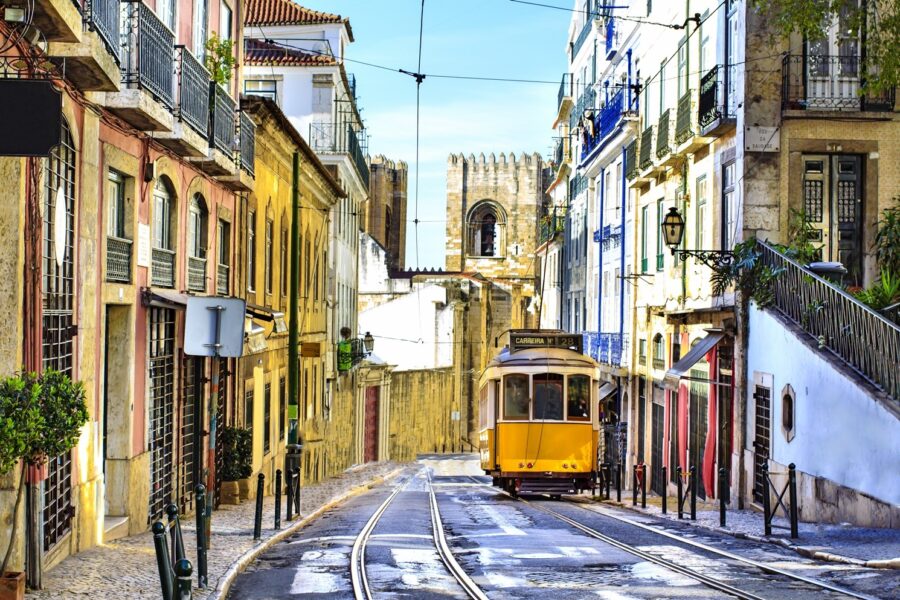
Driving in Portugal
In theory, you could rely entirely on public transport in Portugal. However, outside the larger cities, services are sometimes thin on the ground, especially at weekends. For maximum flexibility, you’re going to need a car in Portugal. Motoring is one of those things that can feel like a minefield in a new country, but we are here to help.
Driving regulations
Portugal drives on the right side of the road. The legal age for driving in Portugal is 18, and seatbelts must be worn in every seat — this is the responsibility of the driver. You will also need to carry the following items in your car at all times:
- A reflective danger jacket
- A reflective warning triangle
- Spare bulbs
- A spare wheel
- Spare spectacles (the RAC confirms you should have a spare pair of prescription glasses if you need to wear them to drive)
- Child seats if your child is less than 135cm tall and under 12-years old
- Driving licenses – UK driving licenses are accepted in Portugal during the first 185 days after arrival in the country. However, see below for more details if you’re living in Portugal permanently
- Road tax
- Vehicle registration documents
Those wishing to drive a car in Portugal must possess a valid national/international driving licence. Drivers should always be in possession of the car’s logbook (or rental contract), and evidence of tax and insurance. Third party insurance is the legal minimum. Failure to produce any of the above on request can result in an on-the-spot cash fine, and it’s not unusual for police to set up random checkpoints, usually on roundabouts.
It’s worth noting that Portuguese citizens have ID cards, which they’re obligated to carry with them. If you’re a UK citizen, you are technically required to carry your passport instead. Some expats carry a photocopy to reduce the risk of losing the original. However, you could find yourself being asked to produce the original at some point.
Legality of your driving licence
One essential thing to sort out, whether you are driving a hire car or one of your own, is the legality of your driving license. If you come to Portugal as a tourist, your UK license is perfectly valid for the first 185 days after arrival. The point when a UK license becomes technically invalid is when you no longer live at the address printed on your photo card. As the UK DVLA will not issue a license to a foreign address, you must take action once you live permanently in Portugal.
You have two options. The easiest is to visit your local IMT office (the Portuguese equivalent of the DVLA) and register your UK license in Portugal. This gives you a supplementary piece of paper that makes your license valid in the country, even if you don’t live at the UK address stated. You’ll need to show proof of your permanent address in Portugal.
The alternative is to swap your license for a Portuguese one. This is relatively straightforward but does require you to get a medical certificate and to send your UK license in for exchange. You are given a piece of paper to show the Portuguese police while you wait for the new license. It is wise to time this well, as you could have problems driving in other countries with only this piece of paper. Hiring a car elsewhere will prove almost impossible, and the waiting times for an exchange can be long.
Cars in Portugal
One thing you’ll quickly learn about transport in Portugal is that cars are surprisingly expensive. The price tag on a vehicle can be anything up to 40% more than you would expect in the UK. This comes as a shock to many people new to Portugal. The reality is that it’s not really possible to pick up a decent “runner” for just a couple of thousand euros. On the bright side, the Portuguese climate is conducive to cars lasting longer, due to less rust.
Some expats decide to bring their UK cars with them, and while some manage to work easily through the matriculation process, many people find themselves bound in Portuguese red tape.
In theory, you should be able to bring one car per person ‘tax-free’, provided you have owned it in another EU member state for at least a year. Non-EU nationals (such as those from the UK) can claim tax exemption if they have owned the car for at least six months and lived outside of the country for this time.
The ‘tax free importation’ regime is complex. As with many things in Portugal, individual experiences vary. Some people methodically work through the bureaucratic steps and complete the process themselves with little cost and little hassle. Others have to jump through hoops and find it very difficult. Some even pay for the assistance of lawyers.
If this all goes to plan, you can end up with a legal Portuguese car (albeit with the steering wheel on the wrong side) for a bill of hundreds rather than thousands. Suffice to say, it doesn’t always go well — you are advised to seek out a recommended matriculation specialist for advice.
Tax, insurance, and other specifics
Car tax, as in many EU countries, is based on emissions. It can range from about €60 per year, right up to around €800 per year for a gas-guzzler. Road tax is payable annually. Most people go to their local Loja de Cidadão (Citizen Shop) to renew it and obtain a new paper document. You display this in the car windscreen.
Insurance is straightforward to arrange, but it’s good to be aware of a few key differences to the UK. Firstly, fully comprehensive insurance is usually only offered for cars less than ten years old. For older cars, third-party is all that’s available.
Secondly, most Portuguese car insurance policies insure the car itself, rather than specific people driving it. In many cases, if the car is insured, you can let anyone (with a licence) drive it — but be sure to check the terms of your policy in detail!
Finally, breakdown cover is usually included in a car insurance policy in Portugal, rather than arranged separately via the AA or RAC as it is in the UK. If you plan to travel into Spain or beyond, you need to ensure your policy covers border-exit.
Once your car is over four years old, it must periodically pass an IPO (MOT) test. These then take place every two years until the car is seven years old, and every year subsequently.
Hiring a car
Organising a car can be daunting in a new country. The most important thing is to take your time. After all, you can always hire a car until you find your own perfect vehicle. You may also need to hire a car for your viewing trip if you’re still in the planning process. You’ll find plenty of hire car companies in all the major towns and airports in Portugal.
Hire cars can be in short supply (and expensive) in the summer months. Conversely, in the off-season period, there are hundreds of unused cars, making for cheap deals and easy availability.
Proof of identity and a valid driving license is required to hire a car in Portugal.
Car maintenance in Portugal
Car maintenance in Portugal is one thing that’s just like the UK. You have a choice of main dealers, repair chains, and independent mechanics. Prices can vary but may well be lower than you’re used to in the UK. Like anywhere, finding a reliable and affordable place to take your car is a real relief!
Learning to drive in Portugal
If you (or a family member) has yet to learn to drive, it’s possible to do so in Portugal. That said, for various reasons it can get complicated. First off, learning to drive in Portugal involves mandatory classroom lessons as well as practical tuition. Virtually all of this is in Portuguese, as is the theory exam.
A few driving schools will offer lessons in English and the opportunity to take a translated theory test. Such schools are few and far between, however. Moreover, as there are mandatory hours, you’ll need to make many trips there. Not great since you can’t drive yet! You may find it more appealing to do a crash course and test in the UK before leaving.
Tips for driving in Portugal
Treat yourself to a toll road
You often have the choice of a good road or a bad road when getting from place to place. An example is the trip between the Algarve and Lisbon. You can drive on the A2: a beautiful, perfectly surfaced road that’s often incredibly quiet. Or take the IP1: a hectic, potholed nightmare that switches from four lanes to two and back again repeatedly. The reason for the difference is that the A2 is a toll road (costing around €20 each way for that journey). The IP1 is free. So you do, quite literally, pay your money and take your choice. The width of the Algarve is similar, offering the choice of the A22 toll road, or the free (and notorious) EN125.
You’ll save on parking…
There’s a great surprise for drivers in Portugal who have become used to the UK. Outside of major cities, and at busy beaches in high summer, it’s unusual to have to pay in car parks. This is particularly pleasing at shopping centres.
…But lose on petrol
Petrol is quite expensive in Portugal, but it’s significantly cheaper in neighbouring Spain. If you live near the border, you can combine a trip to a Spanish supermarket with filling the tank and make a good saving.
Beware of roundabouts
Roundabouts in Portugal come with some very specific rules about what lanes you’re supposed to use. These rules can seem illogical, which is why most local drivers ignore them! However, it’s not unheard of for the police to catch people out on roundabouts and fine them. You’ll find details of the rules here.
You will notice the cultural differences as soon as you start driving in Portugal. Yet the changes don’t take that long to get used to and before long it all feels like second nature. Just try not to join in with the tailgating and crazy overtaking!
Portugal’s public transport
For those who can’t or don’t wish to drive, public transport in Portugal is widespread. Even smaller towns and villages usually have public transport links, although these can be infrequent. For example, many bus routes don’t run at weekends.
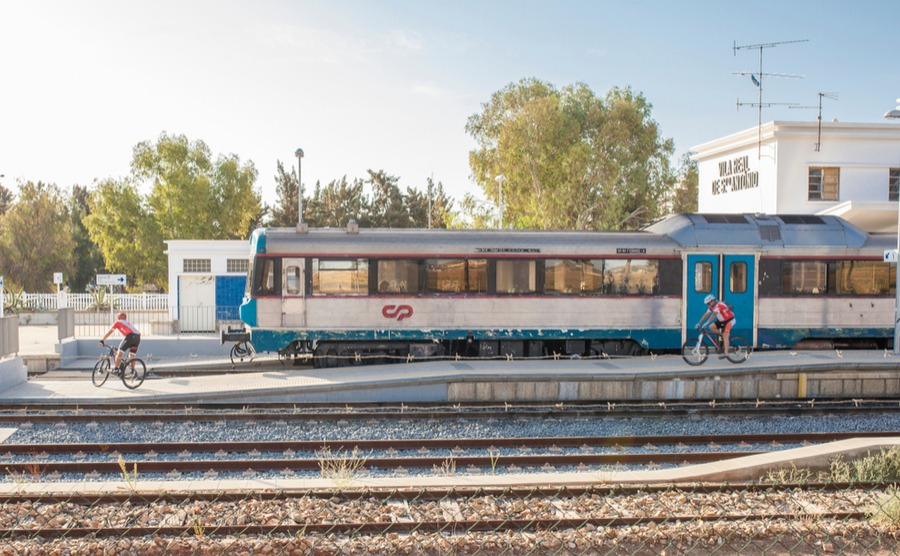
All aboard at a station on the Algarve (Juan Aunion / Shutterstock.com)
Trains
The Portuguese railway system is state-owned. Unusually, train travel is cheaper than the bus in some areas. However, it’s worth knowing that trains are sometimes slower than long-distance buses. You can find details of Portugal’s rail network here.
There are three main types of train service in Portugal.
- Regional trains, marked “R” on timetables, stop everywhere
- “IR” trains are a little faster and make fewer stops
- Faster express trains are branded as rápidoor intercidade (IC).
The Alfa Pendular is the deluxe flagship service, akin to France’s TGV. It offers faster and pricier express services on the Lisbon – Coimbra – Porto mainline. International services are marked “IN” on timetables.
Portugal’s trains are much cheaper than trains in the UK, and there are further discounts for children under 12 and senior citizens. There are frequently offers and discounts available on train transport in Portugal, making it well worth signing up to the CP newsletter.
Portugal’s train service is more reliable than its British counterpart, but trains are much less frequent. It’s therefore important to plan ahead.
City Metros
Metro systems are in operation in Lisbon and Porto. In Lisbon there are four lines, coloured blue, yellow, green, and red. The red line provides a direct connection to the city’s airport. A ticket for a single metro journey in Lisbon costs €1.45, and there are various passes and season tickets available. Using a pre-paid ‘Zapping’ smartcard (akin to London’s Oyster card) saves money on journeys and eliminates the need to queue for tickets. Ticket queues at peak periods have reportedly become a problem in recent years.
The Porto network consists of six lines and 82 stations, and spreads right out to the suburbs. The system uses the ‘Andante’ ticketing system. These tickets are purchased and recharged at machines in stations and can also be topped up at Multibanco ATM terminals.
Trams
There are still five working trams (eléctricos) left in Lisbon. Built in the early 19th-century, they are a distinctive yellow colour, and run on thick iron rails set into the city’s steep, cobbled streets. You can purchase tickets on board, but you may need exact change. You will also find that tram travel is included in city travel passes.
Something a bit different…
There are also some zany and unusual transport options in Portugal’s capital. Lisbon’s elevadores (funiculars) all lead to fine viewpoints over the city. Some were built as early as 1902 by a student of Gustave Eiffel (who built the Eiffel Tower).
For instance, right in the centre of Lisbon’s Baixa district sits a giant steel elevator (the Elevador de Santa Justa), that takes people from the Rua do Ouro up to the Convento do Carmo 45 metres up. The top of this giant lift offers some great views over the city. Other well-known elevadores include:
- Elevador da Glória, in Restauradores Square, just around the corner from the tourist office in Palácio Foz. This takes you up to the Miradouro de São Pedro de Alcântara, a wonderful look-out point with a statue-lined terrace and plenty of photo opportunities.
- Elevador da Bica takes you up from Rua da Moeda behind Lisbon’s central market (Ribeira) to the trendy Bairro Alto, through narrow and interesting streets. A short walk will take you to the Miradouro de Santa Catarina.
- The Elevador da Lavra runs from Largo da Anunciada up to the Travessa do Torel. Here you will find Jardim de Torel, renowned for its views of the city.
Buses
Companhia Carris de Ferro de Lisboa (Carris) buses provide an efficient way of getting around Lisbon and its suburbs. A number of private bus operators run a network of services across the country, and among the largest are Rede Expressos, and the Algarve line, Eva.
Bus services are divided into three main categories:
- Expressos: These are comfortable, fast buses between major cities. Even in summer, you’ll have little problem booking an expressoticket for the same or next day.
- Rápidas: These are quick regional buses.
- Carreiras: Marked CR, these are regular, slow services that make lots of stops.
Youngsters and senior travellers can get up to 50% off bus travel. Most bus-station ticket desks will give you a computer print-out of fares and services on request.
Taxis
Taxis across Portugal charge according to the meter. It’s worth being wary of drivers who don’t switch on the metre as scams are rare but do happen. This is especially relevant in large cities. While there are taxi ranks in most towns and resorts, it’s well worth getting hold of the number of a local taxi firm or driver.
Air travel
National air transport in Portugal is relatively expensive. TAP Air Portugal runs regular daily flights, all year round, between both Lisbon and Porto and Lisbon and Faro. These take less than one hour. Trains are slower on these routes but usually cheaper. Once you’ve factored in the check-in time and the hassle of the airport, the train can seem more appealing. One route that is worth knowing about is the regular Ryanair flight between Faro and Porto, which is often very inexpensive and competitive compared to the train.
For the Azores and Madeira, regular flights leave from Lisbon. There are internal flights between the islands of the Azores. Between Funchal and Porto Santo, there are frequent flights and daily ferries.
Public transport in Portugal is inexpensive and reliable. Even if you do buy a car of your own, it’s well worth making use of some of the other ways to get around.
Working in Portugal

You may be buying a property in Portugal to enjoy your retirement or just for holidays, but if you are planning to live here full time and are looking for ways to generate an income. Some employment options that are particularly popular among expats include:
Beauty treatments
Having an English-speaking beautician or hairdresser is a popular choice with UK expats in Portugal. It can be nerve wracking for those without much language skill to ask for and get what they really want at the local Portuguese beauty salon. If you market yourself and your business well locally, across the expat community, you could find you do really well in this line of work, as there is always demand.
Information technology, web design and internet services
Another area of work often required by British expats is IT services or web design, perhaps for one of the other types of business included in these tips. The hourly or daily rates you can charge will be lower than what you may be used to charging in the UK, however, so you will need to factor this into your plans.
Hospitality
The busier tourist resorts often seek extra help during the peak summer months, whether as waiting, bar, or hotel staff. The seasonal nature of this kind of work needs to be taken into consideration, though, as it is unlikely to last into the quieter periods.
Managing properties
Property management can mean a number of different things. Practically, the most common work available in this area is likely to be cleaning holiday lets, maintaining gardens and pools, and potentially being employed to meet and greet renters, or as a key holder, if you work for a specific property management agency. This is a competitive job market, however, as there are only a certain number of properties that need to be managed and a small number of companies who offer these services. Again, it is largely seasonal work.
Working online
Freelancer websites like Upwork offer work for writers and those who are experienced in the field of public relations, for example, and can write either editorial, marketing, or PR copy.
You may know people and businesses in the UK who still require your services that can be offered remotely, such as writing, graphic design, and other work that can be conducted over the internet. This is possible even if you’ll be living in Portugal for only part of the year with a digital nomad visa.
Tips for finding a job in Portugal
The recovery in Portugal’s economy means that more and more British people are considering finding jobs here. Before you start your job search, however, be aware of some basics.
Unemployment in Portugal has dropped to under 9%. That’s still higher than the UK, but significantly lower than Portugal’s 2013 peak of 17%. It’s also half that of Spain. But while work is a little easier to find now, do bear in mind that basic and unskilled work remains a rarity, with youth unemployment (for those below the age of 24) still high. Most good jobs will require you to speak fluent Portuguese. Those that don’t, such as in tourism, will be highly seasonal.
Okay, with those caveats out of the way – let’s find you a job! Portugal welcomes anyone with a can-do attitude. These tips will give you a good start.
Know where to look
If you’re looking for casual work, you’ll probably hear about such jobs on the ground. However, if you’re after more formal work, for example with a tech company or call centre in Lisbon, you’ll find these roles advertised online. Top Language Jobs has a number of English-speaking jobs in Lisbon. You may also find jobs occasionally come up in the country’s English newspapers, The Portugal News and The Portugal Resident.
Learn Portuguese
If you arrived in the UK unable to speak English, your employment prospects would be poor and the same goes for someone arriving in Portugal who cannot speak Portuguese. If you want to work somewhere that involves interacting with anyone other than expats and British tourists, you need to speak Portuguese. Is learning Portuguese so hard? Frankly, no. Most jobs don’t require full fluency, just basic communication.
There are industries where you can utilise your English, though — most obviously the airline industry. Thanks to Portugal’s booming tourist trade, more and more airlines are setting up routes in and out of the country. Various airlines frequently hold recruitment events in the country, resulting in pilots and cabin crew being able to choose Portugal as their home base.
Similarly, industries such as technology, property, and sports are examples of sectors where opportunities do exist for expats — it’s often just a case of looking hard enough and being willing to both ask and sell yourself when given the chance. You are looking at starting an amazing new life in Portugal so be bold and blow your own trumpet even if that’s not the traditional British way.
Be realistic about earnings
Average salaries in Portugal are low by most European standards. Thankfully the cost of living is relatively low too. However, it’s important to research what your skills will realistically earn you in Portugal, and not assume that you’ll earn the same as you did in Britain, because you won’t.
Whatever way you choose to make money to support your lifestyle in Portugal, make the most of your cash by using a currency specialist to transfer money between Portugal and any other countries. It’s worth setting up a payment plan for any regularly paid work, salary or pension payments that need to be paid internationally, as well as any bills for the ongoing maintenance of your Portuguese property. You can avoid losing money with each payment from fluctuating currency rates and also save up to 4% on the exchange rate each time you need to make a payment. To find out how they can help you, register for a free, no obligation account today.
Look for work at the right time
Portugal’s booming tourism industry is where many residents of the country find employment. During the peak summer months in Portugal, especially in the Algarve, bars and restaurants are crying out for staff. At this time of year, these businesses are sometimes even happy to take on people who don’t speak Portuguese, as they can work with customers speaking other languages.
However, these jobs are often casual and short-lived. There’s little point in looking for these roles at any time other than when the tourist season is just getting underway, because the work dries up when the tourists leave. While plenty of these jobs exist, they’re best suited to youngsters who are trying to fund a summer in the sun. For more permanent work, you’ll need to get into the permanent expat world. Again, this isn’t impossible, if you keep your ear to the ground through the tourist season.
Location, location, location
If finding a job is essential for you to live in Portugal, choose your location carefully. Work in the Algarve and other tourist areas is often seasonal. The best choice of year-round jobs will be in the major cities. Lisbon will arguably come out on top for expats thanks to its growing tech and start-up scene.
If you are planning on living in rural Portugal, don’t despair. You may not get well-paid work — there’s a reason why you’ll often see Portuguese farmers heading to work on a donkey — but if you moved there for the lifestyle, does that matter? Portugal has a thriving rural economy and if you can pick a grape as well as anyone else, why not?
Don’t forget freelance options
Many expats living in Portugal bypass the local job market and set up on their own, with plenty enjoying success with apartment rental businesses, retail, and hospitality.
The internet also makes it possible to access freelance opportunities all over the globe — with clients who have no interest whatsoever in whether you can speak Portuguese. More and more people ‘telework’ from Portugal and other enticing destinations. With a bit of planning, you could join their ranks.
If all else fails, commuting back to the UK each week is now feasible while you improve your language skills and look for opportunities in Portugal. The growth of accommodation sharing sites like Airbnb has brought accommodation costs down and year-round budget flights operate from both the Algarve and Lisbon.
Professional work
Nearly 200,000 Portuguese people live in the UK, most of whom are working. Find yourself in any British hospital and before long you’ll be treated by a Portuguese healthcare professional, with 1,100 nurses arriving from Portugal each year in the NHS (up until 2016). So why not you in Portugal?
There are two essential things to do, neither of which are impossible. Firstly, you need to get your UK qualifications recognised by an appropriate body.
Secondly, you need to be speaking working Portuguese. Although it may look harder than Spanish or French, according to the US Foreign Service Institute’s instructions to its staff, Portuguese is no harder and you can be fluent in less than 600 hours of study. That’s less than two hours per day.
It’s never too soon to start learning Portuguese. Every step closer to fluency is a step closer to a completely open job market. Even an intermediate level of Portuguese will put you ahead of someone with no knowledge of the language.
Beware of ‘cash in hand’
Portugal has a thriving ‘black economy’, and tax evasion is common. Cash in hand often goes together with the kind of casual, seasonal jobs we discussed above.
Working in this way may seem better than nothing but it comes with significant disadvantages. You have absolutely nothing in the way of job security. It also means there will be no record of your earnings for banking purposes and creditworthiness, nor contributions made into Portugal’s social security system, which can make processes like accessing healthcare difficult.
Schools in Portugal

If your children will be living in Portugal with you and they are of school age, it will be of paramount importance to educate yourself on the ins and out of the Portuguese school system and what the best options are for your family.
Education in Portugal is compulsory from age six to 18, with the majority of pupils attending tuition-free state schools, taught exclusively in Portuguese. Students aged 15–18 take secondary education courses, either geared toward vocational study or further academia. Your children will be able to attend these schools free of charge.
The Portuguese state system
This is generally well thought of, but recent budget cuts have placed it under considerable pressure. There are waiting lists for many Portuguese schools, and class sizes are creeping up. In many respects it could be said that the same description would be equally valid in the UK.
Children under three years old can attend nursery. The majority of these are private, with some partly financed by the state. Pre-primary education is optional from the age of three to five, and there are both state-run and private kindergartens, known as Jardins de Infância available. State-run kindergarten is free of charge.
The age of your children will be a key determining factor in where to send them to school. It’s generally considered easier for younger children, who could fit easily into a local state school from five or six and quickly become bilingual to boot. For older children, the process can be far more challenging and stressful.
Primary education
‘Basic education’ lasts nine years, divided into three cycles of education. The ‘first cycle’ lasts four years, the ‘second cycle’ lasts two years, and the ‘third cycle’ lasts three years. A diploma or certificate is awarded at the end of the ‘third cycle’. Secondary education is compulsory after Basic Education and consists of a three-year cycle.
Children aged six by 15 September must be enrolled in their first school year that calendar year. State-run schools are free of charge, and should the state-run schools be filled, private school tuition will be at least partly refunded by the state.
Secondary education
After the ninth year of basic schooling, secondary education branches into different programmes — higher education-oriented (General) and vocational work-oriented (Technological). Students who pass secondary education receive a diploma, which will certify the qualification obtained, and the qualification for a specific job, if appropriate. All General and Technological courses share the following subjects: Portuguese language, physical education, philosophy, foreign language, and Catholic, Moral, and Religious Education.
Tertiary education
At the age of 18, Portugal universities offer bachalareto (undergraduate degrees) and liceniatura (full postgraduate degrees), but spaces are limited. Higher education is divided into two main subsystems: university and polytechnic.
Private and international schools in Portugal
If you have the budget, international schools are an option. These range from well-established (and expensive) institutions such as the international school in Lagoa, to smaller independent private schools, which seem to be springing up with increasing regularity. International schools offer an international approach from pre-primary learning onwards, and follow the International Baccalaureate.
The good news is that a private education in Portugal rarely costs as much as it would in the UK. Some small international schools charge in the region of €300–400 per month, teaching a UK curriculum in a mixture of English and Portuguese.
However, there are downsides of course. The main one is that it’s fair to say that children in international schools are somewhat isolated from their local community. It all depends on the children. An international school is arguably a better fit for a teenager, for whom slotting into a state school with well-established social groups could prove an unfairly stressful experience, especially if the child cannot speak Portuguese. A younger child, however, is far more likely to settle into a local school successfully – and may well soon become fluent in Portuguese!
Renovating your home
Renovating a property in Portugal is an enticing proposition for many, but it’s important to get the details right. Not everything works in the same way as you may be used to in your former country.
Above all, remember that you are in Portugal — a country you probably chose for its wonderful, slow pace of life. So, try not to get too frustrated when everything takes longer than you would expect. It’s just the way things are…

Planning permission
Internal renovations are much simpler to manage in Portuguese properties than external works, as there are fewer legalities to consider. Unless you are changing the core structure of a building (for example, by pulling out entire floors to create a galleried mezzanine) you are generally free to do what you wish with the inside of your home in Portugal.
There are, however, some exceptions. If you buy a home in an area designated as a natural park, you are not allowed to make any changes without permission. But note that some tradespeople in Portugal might still agree to do the work without asking if you have the relevant permission — at your own risk!
External renovations can get a lot more complicated than internal improvements. If you intend to make your property larger or taller, or if you need to change the roof or façade of a building, you will need permission from your local camara (town hall). For this, you will need an architect to draw up plans for you. The language barrier can become an issue here, so if you cannot speak Portuguese, a friendly lawyer can help to ease the renovation process. We also have a handy guide that will help you find an architect and get planning permission.
Once planning permission is granted, it’s important to realise that any permission has an expiry date in Portugal, so you need to ensure work is started in time to avoid going through the entire process again. Ensure you use licensed tradespeople in Portugal. If not, you could get your project completed in time, but then find it difficult to sell on because you don’t have all the necessary paperwork in place.
Finding tradespeople in Portugal
Be sure to check the credentials of anyone you hire to perform work on your property. If you’re tempted to fly out a UK contractor, do make sure they’re qualified locally. Some qualifications, such as UK electrical qualifications, are not valid in Portugal. Work can be considered illegal if not performed — or at the very least, signed off — by a certified person.
Getting your pets to Portugal
One of the most frequent questions we’re asked is ‘can I take my pet with me when I move to Portugal’? – and the answer is an emphatic yes, even after Brexit! Portugal is a great country for pets, where they’ll enjoy the open space, sunshine, and clean air. Here’s what you need to know about bringing a pet with you.

It’s easy to move your pet with you to Portugal!
How are pets treated in Portugal?
It’s a dog’s life in Portugal (even for other pets!). Beyond the tendency to spoil pets rotten, they’ve even got legal protection! Since 2017, domestic animals aren’t just ‘things’, but legally have status as sensitive living beings — which goes some way to show the attitude of the locals. It’s even illegal to refuse a clean, rabies-free animal entry onto public transport. Cafés and restaurants are generally happy for well-behaved dogs to sit in outside areas, although you’re unlikely to find the equivalent of a dog-friendly pub here.
In the summer, dogs can run around to their hearts’ content on nearly all non-lifeguarded beaches, and on all beaches in the winter. Peniche in Central Portugal even has its very own dog beach.
How do I bring my pet to Portugal post-Brexit?
Pet passports issued in Great Britain (England, Scotland, and Wales) are no longer accepted in the EU. Instead, your pet will need:
- a microchip
- a valid rabies vaccination
- an animal health certificate, or a valid pet passport that’s accepted in the country you’re travelling to (pet passports issued in Northern Ireland, other EU countries and several other countries are still accepted in the EU).
- tapeworm treatment for dogs if you’re travelling directly to Finland, Ireland, Northern Ireland, Norway, or Malta
These rules apply to dogs (including assistance dogs), cats, and ferrets.
Obtaining an animal health certificate
Your pet will need a new animal health certificate every time you take it into the EU. If you have multiple pets, the good news is that you can add up to five pets to an animal health certificate.
You can obtain an animal health certificate from your vet. Note, it must be signed by an ‘official veterinarian’ (OV) no more than 10 days before your pet enters the EU.
Your animal health certificate will then be valid for 10 days for entry into the EU and Northern Ireland. Once in the EU, it will be valid for four months for onward travel within the EU and four months for re-entry into Great Britain.
What should I keep in mind about owning a pet in Portugal?
You’ll no doubt want to enjoy your new life in Portugal with your best friend by your side, but there are a few things you may want to bear in mind so you can plan ahead.
Be prepared for the costs
Veterinary bills are quite high in Portugal, higher than those in the UK, for example, so this can take some getting used to, and you will need to budget accordingly. However, all pet owners know what looking after your extended animal family doesn’t come cheap. Some expats we know often joke that they spend more on their pets than on themselves, but it’s worth it!
The main veterinary hospitals in expat areas are the Hospital Veterinário do Algarve, in Faro, and the Hospital Veterinário de São Bento in Lisbon.
There are stray animals in rural areas
If you buy a Portuguese property in a rural location, you will soon get to know the local strays — both cats and dogs, although there are more stray cats. While tempting to adopt them, take them to a local vet to find out if they are microchipped and are actually somebody’s pet before taking them home. Stray animals are rarely neutered or vaccinated, so they often have health problems, which you will need to consider before adopting them.
Beware poison!
Sadly, there are still occurrences of old-fashioned residents in a number of European countries poisoning stray animals, and Portugal is unfortunately one of them. Be vigilant about any meat or food left out in areas popular with strays, in case it is poisoned, and if you find anything suspicious, share it with local expats and vets, if possible.
Be vigilant of natural dangers
Natural threats to your pets, such as snakes and ticks, can be found in Portugal, so make sure you are vigilant and seek guidance from the local vet if you have any concerns.
Make sure to license your pet
In Portugal, pets need a license once they’re three to six months old, so if you have a young pet — or you’ve brought over an older one and you’re not sure if they’re registered — do check with your town hall on how your municipality registers them. You normally need to review each year, currently for around €20.
Finding a pet in Portugal
If you don’t have a pet, or you’re looking to add to the family, there are lots of animal charities and adoption groups to find the perfect furry friend in Portugal. Seek tips from other expats and look online at Facebook and expat forums for recommendations for local animal charities and advice on how you can ensure the pet that you adopt is well cared for before you give them a home.
Portuguese culture and customs
While living in Portugal as an expat, it is likely you will want to make the most of local life and embrace the rich culture and customs that the country has to offer. Here are the key Portuguese traditions and habits to be aware of, from the perspective of a UK expat.
Don’t get the language etiquette wrong
Language etiquette in Portugal is something of a minefield — especially in the Algarve and Lisbon, where most people speak English.
The key point is to keep things smiley and friendly, and let the person you’re speaking to take the lead on the choice of language. If you’re going to live in Portugal, you really shouldn’t be barking out what you want in English — leave that for the tourists, and at least attempt a little Portuguese. However, you shouldn’t then get offended if the conversation flips into English.
While this is initially disconcerting, it doesn’t mean the person you are conversing with is devaluing your attempts at Portuguese. It’s just as likely they’re practicing their English, or that they speak it fluently and are just trying to make everybody’s lives easier.
And finally, whatever you do, don’t speak Spanish because it looks the same on paper. It sounds nothing like Portuguese and rarely goes down well!
Say hello with a kiss and use the right ‘you’

Say hello with a kiss
Like many continental Europeans, the Portuguese greet friends (either two women or a man and a woman) with two cheek kisses. With colleagues, it will depend on the level of formality, but a handshake will normally come before any cheek kisses. Generally, you’ll address people older than you and people you should respect or be polite to, such as a client you’ve just met, as “voce“, or the formal “you”. With friends, you can use “tu“.
Don’t point
Pointing at things, especially people, is considered rude in many cultures, and this applies in Portugal. Unless you’re showing someone what you wish to buy in a shop, try to minimise it.
Respect your elders
Respect for your elders is an important part of Portuguese culture. There is a real sense of respect for those in authority and older citizens, as well as the importance of abiding by rules and regulations. It’s an almost old-fashioned approach, which is very pleasant to experience, particularly when you see the way young people will step aside to let older people walk down the street, for example.
Be sure to respect the police and local officials, too, if you want to be accepted. In the UK and much of Northern Europe, people are used to questioning authority. Youngsters giving ‘back chat’ to police officers, for example, is far from unusual. This does not happen in Portugal. Authority figures, from police to council officials, expect (and are given) respect. This is sometimes frustrating, especially when trying to fight against seemingly endless bureaucracy, but it does — in many ways — work towards the traditional values that make the country so appealing.
If you doubt this focus on authority and wish to partake in a foolish experiment, try raising your voice with a government official, or being petulant if your car is randomly stopped. You’ll soon see where a bad attitude leads you!
Don’t write in red pen
The Portuguese can be superstitious, and it’s a good idea not to write anything in red pen, whether you’re signing a contract or just writing out a birthday card, as it’s considered rude to the receiver.
Don’t rush
This doesn’t apply in the major cities of Lisbon and Porto, but broadly speaking, people in Portugal don’t rush if they don’t have to. This is a country where people take the time to enjoy simple pleasures and aren’t always striving to move onto the next thing.
Many people cite this slow pace of life of a key reason to live in Portugal, so try to enjoy it. The only big exception to the ‘no rushing’ policy is while driving a car, as you’ll be very much aware when you experience the country’s roads.
Embrace Portuguese food culture
Food and drink in Portugal are of the utmost cultural importance. Mealtimes are a social activity and time to sit back and relax. You will rarely find a local who races through a meal on the way to something else!

Portuguese food is deservedly becoming famous worldwide.
There is a wealth of good food and drink in Portugal and the Portuguese eat very well. Nowhere is this more evident than at a special occasion — a birthday celebration is the perfect excuse for a big and delicious cake, and savouries feature prominently on the menu, too. An endless array of traditional dishes will be on display, with various members of the family working hard to prepare the feast, often days in advance of the gathering.
A lot of Portuguese food originates from traditional hearty dishes and peasant food historically prepared in the country. It mostly consists of fresh fish, shellfish, chicken, and pork.
African and Eastern influences also pervade traditional Portuguese recipes, with spices such as cumin, pepper, and coriander featuring regularly. These spices were actually introduced to the Mediterranean by the Portuguese, along with coffee, rice, pineapple, and potatoes. Traditionally popular flavours include piri piri, cinnamon, saffron, and vanilla, harking back to the Moorish and Arab influences from ancient Portugal, and the traditional Portuguese recipes of old.
Food and drink in Portugal is fresh, locally sourced and sustainable. This was fashionable long before the various food movements in the UK and US! Food is also an important part of local culture, with food festivals held annually to celebrate different aspects of local cuisine. Festivals can revolve around octopus, chestnuts, chorizo, and — perhaps the most famous food to come from Portugal — sardines.
Typical food and drink in Portugal
Soup is a traditional mealtime staple. It’s where many Portuguese ingest a fair proportion of their vegetable intake! Well-known soups include caldo verde, made with potatoes, kale, and spicy sausage. Dried cod (bacalhau), is also a popular dish, found throughout the country in a wide variety of preparations.
Seafood is a key part of the Portuguese diet. Fish such as sardines, trout, salmon, and sole are popular and common across the country. Fresh fish is usually grilled or fried, or served with sauce in a type of casserole. Grilled chicken is also incredibly popular in Portugal, and you will usually find it marinated in olive oil, garlic, and chillies. However, beyond a basic piri piri, the wide selection of sauces you might be used to seeing with ‘Portuguese’ chicken in the UK is more of a Nando’s gimmick!
Vegetarian options can prove difficult to find in quieter parts of Portugal, although this situation is steadily improving. Vegetables are traditionally served as a side order rather than a main dish. In some traditional restaurants, they may even assume that small quantities of ham in a salad are OK for vegetarians! Indian and Chinese restaurants are often a good place to find some more vegetarian options.
The Portuguese, like the Spanish, are night-owls, and tend to eat later than we do in the evenings. Restaurants generally open for lunch from noon to 3pm and dinner from 7pm to 10pm, or later, depending on the type of restaurant and its location. Bars tend to be open until between Midnight and 2am, and often later in the summer and in tourist areas.
A Portuguese tradition is to get a selection of small snacks brought to you as soon as you’re seated in a restaurant, such as bread, olives, or cheese. These are known as couvert and will be charged to your bill. You can turn them away if you wish, but many people choose to have them in place of a starter. They’re rarely expensive, but do be aware that some ‘tourist trap’ restaurants can charge a lot of money for them.
Portuguese wine
We can’t discuss food and drink in Portugal without covering wine! You may not be aware that Portugal is the 10th biggest producer of wine globally, but you are likely to know about two of Portugal’s well-known exports, Port and Madeira.
Portugal is home to two wine regions designated as UNESCO World Heritage sites — these are the Douro Valley, almost 200 years old, and Pico Island in the Azores. Some of the other famous Portuguese wine regions are Alentejo and Dão.

Did you know Portugal is home to over 4700 wineries?
Minho, in north-west Portugal, is home to the famous Vinho Verde (green wine). This wine is not really green — it can come in red or white varieties. It’s produced from young grapes with a lower sugar content than normal wine grapes. It is also lower in alcohol, thanks to a short fermentation process, and perfect with fish.
Wine from Dão is made using grapes from the mountainous region. Red wines from this region are fruity, and the white wines — like most in Portugal — are dry.
Although Portuguese wine is now extremely popular outside the country, one could argue that the Portuguese keep the best for themselves. The staple Portuguese favourites are rarely found outside Portugal, where wine is an inexpensive day-to-day luxury.
It’s easy to fall in love with the food and drink in Portugal, and you’ll never struggle to find a local to talk about it. It’s a source of considerable pride and passion.
Easy does it with alcohol
While alcohol of various kinds is popular in Portugal, ‘binge drinking’ does not really exist in the country — even with teenagers — so, despite a tendency to start drinking rather early in some cases, you don’t often see drunken and silly behaviour on the streets. Like many other European countries, the reason for this is a slow and steady approach to drinking alcoholic beverages, balanced with drinking coffee (usually an espresso) and water. Agua de Pedras is a popular sparkling water, which tastes slightly salty, and is actually rather nice.
So, if you want to integrate with people in Portugal, outside of boozy expat groups, try to keep your consumption of alcohol reasonably moderated and dignified. Portuguese people are unlikely to pull anyone up on their drinking-related behaviour — but at a certain point they may start laughing uncomfortably at you, rather than with you.
Sports in Portugal
If you want to spend your leisure time playing sport in Portugal, you’re going to find yourself spoiled for choice. The favourite activities for many often involve golf and football! Alternatively, you can make full use of the Atlantic Coast by enjoying watersports, such as windsurfing, sailing and surfing.
A nation obsessed with football
In common with the UK and Spain, football is practically a national obsession for Portugal. The Portuguese watch a lot of local football, supporting both their national and international teams. They also enjoy watching Spanish and English matches.
Playing football is very popular too. Most football is played on hard pitches in Portugal. There is an abundance of local teams to play for and get involved with. This is a great way to meet new people and bond. In popular expat areas, there are sometimes dedicated expat teams to play for. If you love football and enjoy playing, this is definitely worth looking into, especially if you’ll be living in Portugal permanently.
If you fancy watching some live action, the atmosphere at football matches in Portugal is friendly, and attending costs far less than it does in the UK. In the Algarve, locals tend to watch and support Olhãnense, who are in the first division.
Golf: The other national pastime
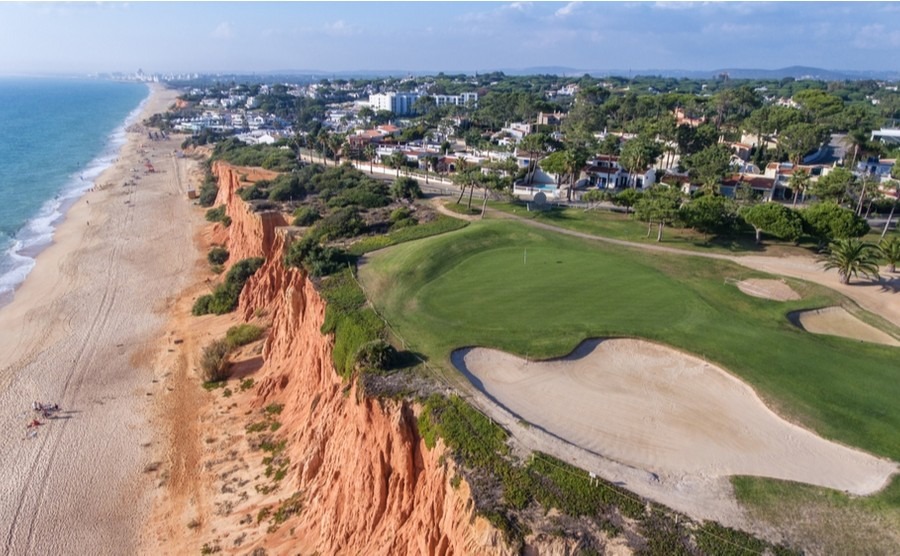
Golf and beaches at Vilamoura
Golf is an incredibly popular sport in Portugal, with high-quality courses dotted across the country. In fact, Portugal is known for having some of the best golfing facilities in the world. It is often the specific reason that overseas property buyers look to buy a home in the country. Golf isn’t always a cheap hobby. However, off-season offers allow residents to take full advantage of local facilities for a minimal spend. Find out more about golf in the Algarve.
Coastal leisure pursuits
Any and every sport and pastime that involves the sea is easily available in Portugal. Many people specifically choose to live somewhere with easy access to the extensive Atlantic coast. As you would expect, fishing and sailing are popular. Other watersports, such as windsurfing, water skiing, surfing, and jet skiing are also readily available on the Portuguese coast.
Fitness and quality of life
Portugal is known for the quality of life the country offers. It’s easy to stay fit in Portugal, with hiking and cycling trails galore, a wide variety of sports, and good quality local facilities. Gyms, swimming pools, and fitness classes, such as yoga or dancing, are all easy to find, and often cost less than they would elsewhere in Europe.
Another notable trend is one seen in other countries — the free outdoor gym. These are available in lots of Portuguese towns and cities.
Shopping in Portugal
Shopping in Portugal can be a real pleasure. You can choose from markets, rustic town centre shops, or glitzy malls. Best of all, you’ll find that outside of major cities, the shopping experience is usually rather laid-back and stress-free. It’s often a world away from shopping in the UK.
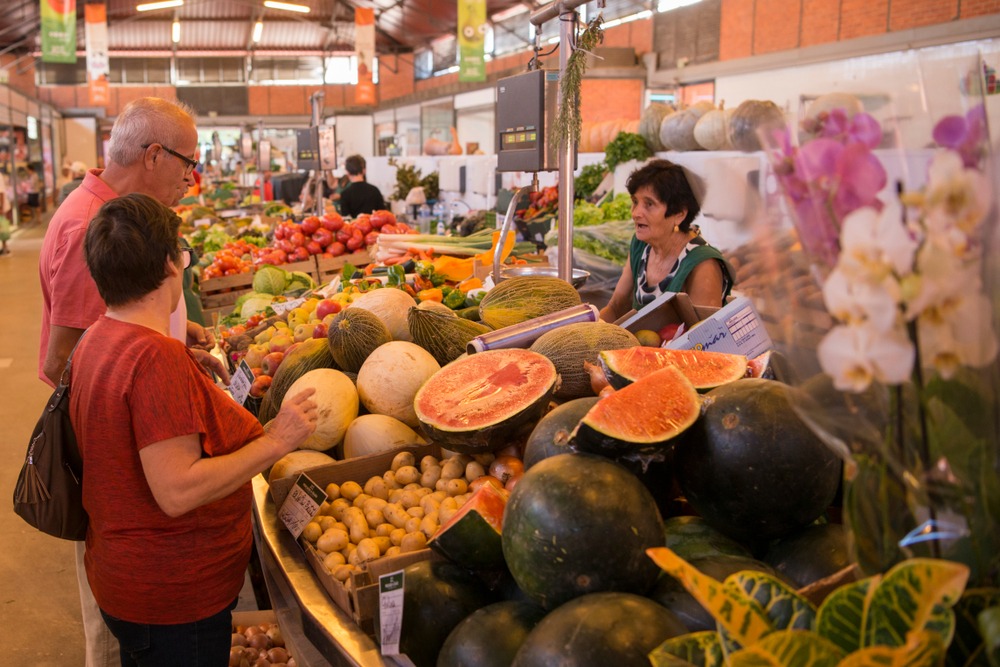
The East Algarve retains a very ‘local’ authenticity.
Market shopping in Portugal
The local market (mercado) is often your best bet for finding good quality, low-cost food, from meat and fish to fresh fruit and vegetables. Portuguese markets can range from small village affairs with just a few stalls, to huge daily events in larger towns. Whichever type you visit, you’ll capture a wonderful slice of authentic Portuguese life.
Municipal food markets provide an opportunity to haggle and bag a bargain or two. Mercados in the larger towns open early in the morning, usually Monday to Saturday. They run through the morning before winding down around lunchtime. Larger markets, selling everything from clothes and homewares to tools and children’s toys, take place in certain towns on a weekly or monthly basis. Sometimes these sell food as well, and even livestock.
If it’s the local markets that are drawing you to life in Portugal, take a look at our suggestions of the five best market towns and cities in the Algarve.
Village and town shopping in Portugal
The centres of Portuguese towns are traditional in style. You’ll often find local specialist shops such as bakeries, butchers stores, haberdasheries, and florists.
Things well worth looking out for include pastelerias, shops that usually combine a café with a takeaway counter for bread and cakes. If you see “fabrico proprio”, you know the products are made on the premises. Independent butchers (talhos) often sell meat at lower prices than supermarkets. It’s well worth establishing a good relationship with these shops, as they can often source items that are harder to find elsewhere (such as fresh lamb in the Algarve).
Most towns also have small minimercados. These can range from poorly-stocked corner shops to Tardis-like independent grocery stores. It’s well worth familiarising yourself with what you have nearby. Product ranges can sometimes be unpredictable and quirky!
Supermarkets in Portugal
Despite there being markets almost everywhere and plenty of independent shops, expats and locals alike are often attracted to the convenience of supermarkets in Portugal.
Pingo Doce is the main Portuguese chain. It’s inexpensive and many branches have a very good fish counter. European chains Intermarché, Continente and Jumbo (Auchan) are also widespread. Finally, discounters Aldi and Lidl are found all over Portugal. These stores are not necessarily seen as the budget option that they are in some other countries. Furthermore, they can prove really useful for ethnic and imported goods. There’s often lots of demand among expats when there’s a promotion on Chinese or Italian ingredients in Lidl or Aldi!
Wherever you go shopping in Portugal, it’s worth knowing that prices can vary significantly. This is especially relevant for non-Portuguese goods. You can find that a certain item costs considerably more in one supermarket chain when compared to another. As such, you can save money by learning these quirks.
Shopping malls in Portugal
The Portuguese love modern shopping malls, and it feels like there’s always a new one popping up somewhere. There are modern shopping malls around the cities of Lisbon, Porto, and Cominbra, and plenty across the Algarve. In addition to plenty of shops, you will also find a wealth of restaurants, bars, and cinemas in these locations.
It’s often possible to enjoy shopping in Portugal’s malls at a relaxed pace. Thanks to long opening hours, they’re often quite sedate, making for a relaxing experience. Exceptions include Sundays, when you often see several generations of family shopping together, and summer evenings across the Algarve.
Opening hours for Portuguese shops are usually Monday–Friday, opening at 9 or 10am, and closing at 7pm. You will find that the shopping malls are usually open later (often until midnight in summer), and throughout the weekend.
Whether you’re just starting out on your property search or planning the details of your move, living in Portugal is an exciting prospect. With the advice above, you’ll settle into your new life in no time at all!
Our team is made up of property experts and expats, so you can be confident that you’re only getting accurate, first-hand advice. So make sure to keep checking back for all the latest Portugal property news, financial guidance, buying tips, and more.
Sources used: Afpop, Gov UK Living in Portugal, Gov UK Healthcare in Portugal, Gov UK Moving or Retiring Abroad, Your Overseas Home Cost of Living 2023 Index, EPortugal.Gov.pt, RAC, IMT, Comboios de Portugal, Carris, Rede Expressos, EVA Transportes, Top Language Jobs, Recognition of UK qualifications, Schools in Portugal, Doree Bonner, Taking your pet abroad, Wine producing countries, Golf in the Algarve
You can also find a great selection of downloadable booklets, including a version of our Portugal Property Guide:
Buying in Portugal – Relevant, up-to-date information and tips from Portugal property experts and expats on how to buy property in Portugal.
Healthcare Abroad in 2018 – Taking care of your health doesn’t stop when moving to Portugal. Get this one stop shop for expatriate healthcare.
Your Viewing Trip Guide – A handy guide to everything you need to know for planning a successful property viewing trip in Portugal.
A Property Buyer’s Guide to Currency – A currency specialist’s ‘insider’s guide’ to a successful property purchase, written by the experts.

Julia Hope,
Your Portugal Buying Specialist
Speak to an expert
Though we cover almost every angle of buying property in Portugal in this guide, it's perfectly understandable if you've still got some questions! You can contact our team of Portugal experts on +44 (0)20 7898 0549 from Monday–Friday, 8:30am–6:00pm or email [email protected].
We can assist you with almost anything to do with your relocation, whether you need advice on what to do next in the buying process or how to start planning your viewing trip. We can also use our proven network of connections to put you in touch with:
- Estate agents
- Currency specialists
- Solicitors
- Independent financial advisers
- Property surveyors



